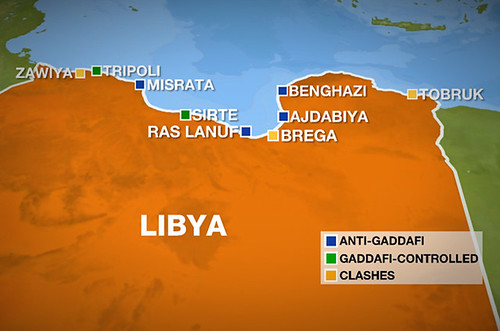
Map purported to illustrate those cities in Libya that are under the control of the western-backed rebel forces. The Libyan military is fighting to reclaim territory from the rebels. a photo by Pan-African News Wire File Photos on Flickr.
20th March 11
North Africa unrest cripples local transport
Guardian on Sunday Correspondent
Petrol prices in Arusha and other towns in northern Tanzania have shot up from Sh1,760 to Sh2000, with each fuel outlet fixing a different price depending on the source of its supply.
Prices are likely to continue shooting up even further as political unrest spreads in Libya and other oil exporting countries, the Chairman of Petrol Stations Association of Arusha, Walter Maeda said.
The situation is negatively affecting transport industry, and the economy as a whole. Maeda said prices could come down if Russia, Saudia Arabia and Iran boost production and supply to cushion the shortfall created in North Africa.
The first sector to feel the pinch of price hike is local transport. Taxi-cab operators are hinting that they might either raise to Sh2,500 from Sh2,000 the standard town trip charges or park the cars in their backyards, hoping for the situation to improve.
A number of private vehicles have also been diminishing from the town roads due to high costs of running them. “We, private vehicles owners have just realised that being pedestrians is not only good for exercise but rather economical as well,” says Jamila Omar, a Njiro suburb dweller in Arusha
Surface and Marine Transport Regulatory Authority (Sumatra) already announced new fares for town and long distance buses effective on March 14.
Sumatra official Ms Beatrice Chao, unveiled the new rates as follows: 0 to 10 km is Sh300 from Sh250; 11 to 15 km is Sh350, up from Sh300; 16 to 20 km Sh400 from the previous Sh350; 21 to 25 km Sh500 up from Sh450. Students’ fare is now Sh150, up from Sh100.
The rates for long distance regular buses plying on tarmac road will be Sh30.67 up from Sh26.6 per km and for those commuting on rough roads the new fare is 37.72 up from previous 30.67 per km.
She said for the luxury buses whose old fare was Sh46. 4 per km, the new fare will be Sh51.64 per km. Bus owners are required to display the fares and issue tickets for every passenger.
The display is required to indicate the bus owner, the point of commencing and ending the journey. Under the new regulation, Sumatra is emphasing personal cleanliness of personnel who are also required to be in uniform
Other conditions are avoiding abusive languages, despising of students and short-cutting routes.
The Director of Passengers’ Rights, Godson Ole Kirita urged government to work closely with the public with regard to fares.
Car owners in Arusha are concerned by the fuel rackets organised by unscrupulous gas station operators, who are alleged to be mixing gasoline with kerosene (paraffin), in order to boost their fuel stocks. "The mixture chocks and sometimes totally kills the vehicle engines," explained Boni Meing’ova, adding that it is strange that the oil adulturation is still rampant with the relevant authority
When asked if he knew about the racket, Maeda said he only hears about this dubious fuel deal and his association had been investigating but so far none of the local gas retailers has been found to have committed the offence.
No comments:
Post a Comment